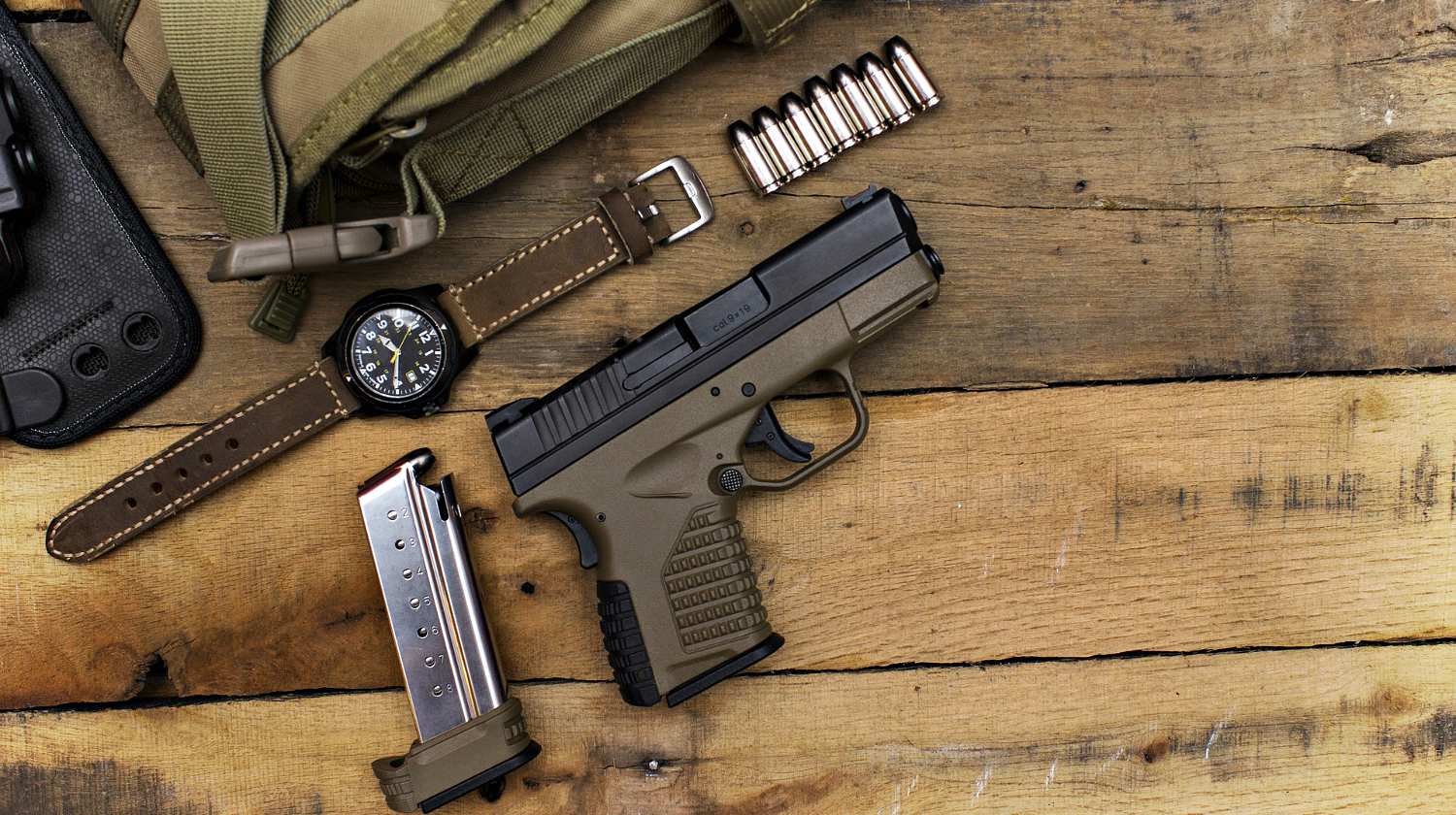Laws & Rights
How To Travel Interstate With Your Firearm
Published
1 year agoon

If you love a trip with your concealed weapon, then you need to know how to travel interstate with your firearm.
RELATED: No Guns Allowed Signs | What A Responsible Gun Owner Can Do
In this article:
How to Travel Interstate with Your Firearm | Your Q's, Answered
What Is the Big Deal About Gun Laws?
Being a carrier entails the knowledge of how to travel interstate with your firearm.
Owning a gun is one thing. Traveling with a gun in the car is a whole different story.
If you plan on transporting firearms across state lines, you need to do a bit of research. It ensures you don't violate any concealed carry laws along the way.
The different state rules on owning and traveling with firearms are the biggest source of confusion for gun owners. What one state may allow may be illegal in another.
In addition, these laws can change. It becomes important to update yourself, especially if you like traveling with firearms.
State laws are also not the only things to worry about when learning how to travel with your firearm.
You also need to familiarize yourself with federal laws that outline specific establishments where you cannot enter with a gun—the post office, for one.
Is There a Law That Tells How to Travel Interstate with Your Firearm?
Many states require people to take concealed carry classes before they can receive permits. These, of course, effectively provide future gun owners with a primer on state and federal firearm laws.
What they don’t do is cover interstate travel. If you want to enter another state with your guns, especially one that is not a fan of firearms, then you’ll still have to do your research.
Before proceeding any further, I want to point out I’m not a lawyer. I am not giving away legal advice. Please consult your attorney before transporting ammunition by car to avoid problems along the way.
The information below, though, may still be helpful.
The Federal Law
As a general rule, you may cross state lines with your guns, thanks to a little-known law called US Code 926A. The catch is, it only works if you follow certain provisions:
Notwithstanding any other provision of any law or any rule or regulation of a State or any political subdivision thereof, any person who is not otherwise prohibited by this chapter from transporting, shipping, or receiving a firearm shall be entitled to transport a firearm for any lawful purpose from any place where he may lawfully possess and carry such firearm to any other place where he may lawfully possess and carry such firearm if, during such transportation the firearm is unloaded, and neither the firearm nor any ammunition being transported is readily accessible or is directly accessible from the passenger compartment of such transporting vehicle:
Provided, that in the case of a vehicle without a compartment separate from the driver’s compartment the firearm or ammunition shall be contained in a locked container other than the glove compartment or console.
What Does It All Mean?
There will be variations on gun transportation laws by state. Regardless of these, you can still legally cross state lines as long as you satisfy the following three conditions:
- You have a license to carry firearms in your home state for any lawful purpose (like self-defense).
- You can lawfully possess firearms in your destination.
- The car doesn’t have a loaded firearm. It must be out of your reach along with the ammunition.
If you want to be extra safe, a lawyer I talked to suggested locking the ammo and guns in separate lock boxes. These can be in the trunk or anywhere you cannot reach immediately.
This is especially important when passing through a state that doesn’t like guns.
He also added it’s best to not stop at all at such states. Keep in mind the U.S. Code 926A only allows you to travel through, not to, the states where it’s illegal to carry firearms.
RELATED: Gun Storage | How To Hide Your Gun Safe
Here’s an Example
In 2015, I brought my family to Florida to go see the giant mouse. I can legally own and carry in my home state and in Florida.
Here’s the thing, though. Unless I want to take a two-hour detour on a twenty-hour trip with three little kids, I have to drive straight through Maryland.
If you didn’t know, traveling through Maryland with a handgun can be difficult. The state has one of the toughest gun laws.
It’s a good thing I can have a way around this situation.
I can have (and carry) my gun where I’m from and where I’m going. Most of all, the U.S. Code 926A protects me even when I am passing through such a tough state.
What we did was drive to Gettysburg, which is right on the southern border of Pennsylvania. We got out to give the kids a restroom break, and I locked up my firearm and ammunition.
We then drove straight through Maryland. I was careful to not have any instances the police would pull me over.
Once I got to Virginia, it was safe to breathe again because I was back in a gun-friendly state. Virginia reciprocates with Pennsylvania.
South Carolina does not reciprocate with Pennsylvania, so it was the same deal there. They are a gun-friendly state, though, so I wasn’t stressing.
My lawyer also suggested we adhere to any magazine restriction laws.
I bought my XD Mod.2 with the short mag to make sure I wasn’t breaking any laws.
I believe he didn’t want us to give local authorities any reason to jam us up and lock us in prison. We want to take as many precautions as possible.
What Is Reciprocity? Reciprocity, in relation to gun laws, means the state honors the permits issued by another. In this process, the gun owner doesn't need to worry about any arrest for carrying such a weapon.
Is There a Way to Avoid Arrests When Traveling with Firearms?
I want to take a moment to stress a few things here.
First, for this to apply, you cannot simply own a firearm. It seems the law requires you to carry your firearm with a license or permit.
Therefore, in states like Vermont that don’t give permits, you may be up that proverbial creek.
Please travel with caution as well. Make sure you understand the laws on how to travel interstate with your firearm.
It’s one of the reasons why US Law Shield is great.
It’s only $10.95 per month to join. It also has a multi-stage coverage across 50 states, as well as Puerto Rico and Washington DC.
Whenever I go on vacation or business travel, I can call up and ask a lawyer to write a “travel opinion letter.”
He contacts a program attorney in each of the states I plan to travel through. He then explains what to do through each state in a highly detailed letter that I can carry with me.
The letter is on official letterhead and even explains 926A in detail. The last time I traveled, it was 10 pages long, and I only went to Virginia.
Why is it important the letter explains 926A?
A lot of police officers may not have any idea about it. They hear 926A and say, “Okay, and what does that have to do with the laws in Maryland State?”
It isn’t their fault. They don’t need to learn the federal law.
Here’s another take on the issue on how to travel interstate with your firearm courtesy of Guns & Gadgets:
Learning how to travel interstate with your firearm is difficult and time-consuming. You need to do your research.
If you know the laws that apply and put them to use, though, you can safely cross state lines and still protect your family while doing it.
Are you aware of this federal gun law? Let us know in the comments section below!
Up Next:
- How To Fly With A Firearm
- Flying With Firearms | The Legal And Responsible Way To Do It
- Flying With Firearms | Part Two: During Travel and After Arrival
Follow us on Facebook, Instagram, Twitte
**Disclaimer: All content on this site is for informational purposes only. Please read our full disclaimer**
Editor’s Note: This post was originally published on January 28, 2019, and has been updated for quality and relevancy.

Staccato P Review | Staccato P 1000 Round – The Most Accurate Duty Pistol

Sawed Off Shotgun | Everything You Need To Know

CZ 75 SP01 Tactical Gun Review | Gun Carrier

PODCAST: Gun Law Changes All Across America Right Now

PODCAST: How to Win Olympic Gold

PODCAST: 50 Important Ideas For Self-Defense, Self-Reliance, and Personal Safety



Pingback: Flyover States No More | Where Will You Roadtrip To Next? | Homesteading Simple Self Sufficient Off-The-Grid | Homesteading.com
Luke Mars
December 16, 2017 at 6:18 PM
I think you are a fearful person who sees dangers that don’t exist and fails to understand a more true connection between us all. Carry your guns. Carry your love. I will give my prayers to you and your fears and explore the Devine to deliver you from your own misconceptions. Love to you.
Bo
April 21, 2016 at 7:16 PM
Easier to be an illegal alien or a hard criminal. ?For all others self defense is for all practical purposes illegal.
Damon
April 5, 2016 at 12:19 PM
Jeffrey Manners · Head Photo Tech at Walgreens Drug Store
This still only applies to driving and not flying.
Not exactly true; Check “TSA-Traveling with special items”